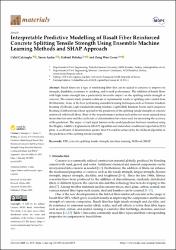Interpretable predictive modelling of basalt fiber reinforced concrete splitting tensile strength using ensemble machine learning methods and SHAP approach
Künye
Çakıroğlu, C., Aydın, Y., Çakıroğlu, C., Bektaş, G., Geem, Zong W. (2023). Interpretable predictive modelling of basalt fiber reinforced concrete splitting tensile strength using ensemble machine learning methods and SHAP approach. Materials Today Communications, 16 (13), 1-18.Özet
Basalt fibers are a type of reinforcing fiber that can be added to concrete to improve its
strength, durability, resistance to cracking, and overall performance. The addition of basalt fibers
with high tensile strength has a particularly favorable impact on the splitting tensile strength of
concrete. The current study presents a data set of experimental results of splitting tests curated from
the literature. Some of the best-performing ensemble learning techniques such as Extreme Gradient
Boosting (XGBoost), Light Gradient Boosting Machine (LightGBM), Random Forest, and Categorical
Boosting (CatBoost) have been applied to the prediction of the splitting tensile strength of concrete
reinforced with basalt fibers. State-of-the-art performance metrics such as the root mean squared error,
mean absolute error and the coefficient of determination have been used for measuring the accuracy
of the prediction. The impact of each input feature on the model prediction has been visualized using
the Shapley Additive Explanations (SHAP) algorithm and individual conditional expectation (ICE)
plots. A coefficient of determination greater than 0.9 could be achieved by the XGBoost algorithm in
the prediction of the splitting tensile strength.

















